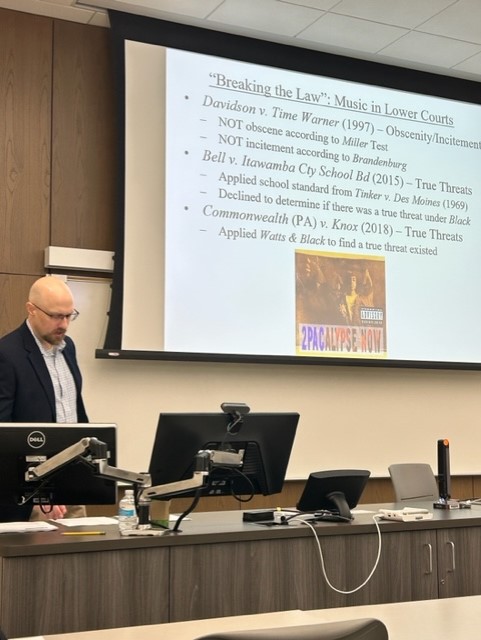On Wednesday, Oct. 18, Eric Kasper, political science professor and the director of the Menard Center for Constitutional Law Studies, gave a presentation on the history of music censorship.
The presentation, hosted by the Menard Center, was free and open to all. Kasper said the presentation was inspired by an article he wrote that was published earlier this year.
The presentation covered a general history of music censorship from Plato to modern U.S. Supreme Court hearings.
“If we go back to the time of Plato, as well as our own time, government officials have known the power of music and tried to harness that power in various ways, including trying to censor the music they thought was dangerous or problematic,” Kasper said.
Kasper said in the United States, music falls under First Amendment protection, just like it would if it was a speech or published work. Kasper said before 1989 and especially during the Vietnam War, some music was targeted for having a political message.
“Government officials (were) trying to exercise some sort of influence or power over musicians,” Kasper said. “This starts to taper off pretty significantly. Part of the reason this tapers off is the U.S. Supreme Court starts issuing more forthright decisions.”
Kasper said it’s important for students to know about freedom of expression rights so they know what they can and can’t do.
“It’s a right that’s meant to empower everyone, including students, to be able to express themselves,” Kasper said.
“I think that people take music more literally because music often has more power than just speech,” Brooke Leval, third-year history education student,, said. “People get more excited about music and what it has to say.”
Kasper said students can fight censorship by having discussions, organizing a rally or writing a letter to a local official or press publication. Students can show their support for politicians against censorship.
“Music should have the same level of protection as those forms of expression,” Kasper said. “That’s really essential that musical artists have that full freedom to express their ideas and that listeners have the ability to listen to the full availability of musical options that are out there.”
Leval said the talk helped her gain a better understanding of all the Supreme Court decisions surrounding the issue, as well as how censorship is a matter of constitutional law. He said he enjoyed these events and attends them often.
Kasper said the next major event the Menard Center has planned is called “Correcting the Narrative” and will involve the topic of post-incarceration challenges. The event will include a short film and a panel on criminal justice and reintegration.
“Music is important because of its connection to personal autonomy. The ability to choose what it is that you either want to express through the music you make, or through the music that you listen to, or the music that you play if you’re hosting friends over for a party,” Kasper said. “It’s a way of expressing yourself.”
Kleinhans can be reached at [email protected].







